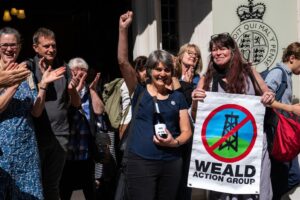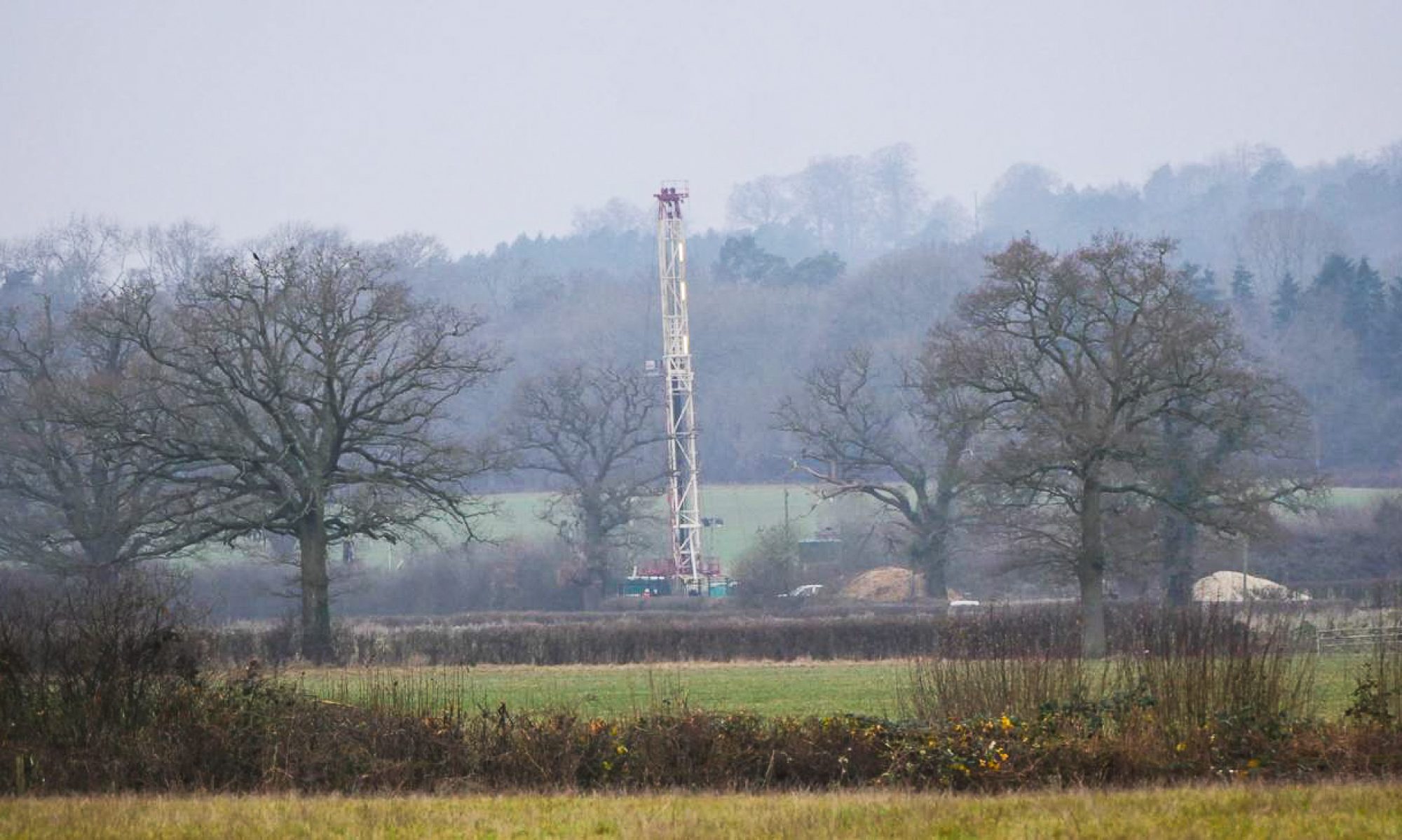
- Groundbreaking judgment could have profound implications for new fossil fuel projects, including Cumbrian coal mine and North Sea oil and gas fields
Surrey County Council acted unlawfully by giving planning permission for oil production at Horse Hill in the Surrey countryside without considering the climate impacts of when the oil is inevitably burned, the Supreme Court has ruled today.
The landmark judgment follows a legal challenge brought by former Surrey resident Sarah Finch, on behalf of the Weald Action Group. The case challenged Surrey County Council’s decision to grant planning permission for oil drilling at Horse Hill, near Gatwick airport in the Surrey countryside.
It could have enormous impacts on all new UK fossil fuel developments – including proposals for a controversial new coal mine in Cumbria and North Sea oil and gas projects.
Ms Finch argued that the environmental impact assessment carried out by Surrey County Council (which declared a climate emergency in 2019) should have considered the climate impacts that would inevitably arise from burning the extracted oil, known as ‘Scope 3’ or ‘downstream’ emissions. This didn’t happen, despite the reality that more than 10 million tonnes of carbon emissions would be produced when the oil extracted is burned.
Scope 3 emissions are increasingly being left out of environmental impact assessments when planning applications are made for fossil fuel projects – including plans for a new coal mine in Cumbria and new North Sea oil developments, despite the huge impact they would have on the escalating climate crisis.
Today’s groundbreaking ruling is a heavy blow for fossil fuel lobbyists. When the developers for the Whitehaven coal mine and the Rosebank oil field in the North Sea sought consent for their projects, they provided no information on downstream emissions in their environmental statements. Both projects are subject to legal challenges, and today’s judgment clearly has implications and strengthens the cases against them.
The UK is already veering dangerously off track for meeting its legally binding carbon reduction targets, and its international pledge to reduce emissions by two-thirds by 2030.
Friends of the Earth, who has supported the case from the outset as an intervenor says that the Supreme Court ruling means that:
- The landscape around the granting of planning permission for fossil fuel extraction has been fundamentally changed.
- Going forwards, it will be harder for fossil fuel promoters to get consent for their projects. The judgment is very clear that the inevitability of the end-use emissions of this oil project meant they were indirect effects of the development, and so needed to be factored into EIA. As is recorded in the Supreme Court’s judgment: “The whole purpose of extracting fossil fuels is to make hydrocarbons available for combustion.”
- The government’s controversial decision to give the go-ahead to a new coal mine in Cumbria in December 2022 could well be impacted. The carbon emissions from burning the extracted coal were not included in the developer’s environmental statement. Friends of the Earth and local campaign group South Lakes Action on Climate Change (SLACC) have brought legal challenges to the Secretary of State’s decision in the High Court, which will take place on 16-18 July 2024.
- Uplift and Greenpeace are challenging the government’s decision to allow development of Rosebank, the UK’s largest untapped North Sea oilfield, which could also be impacted.
Sarah Finch said:
“I am absolutely over the moon to have won this important case. The Weald Action Group has always believed it was wrong to allow oil production without assessing its full climate impacts, and the Supreme Court has shown we were right.
“This is a welcome step towards a safer, fairer future. The oil and gas companies may act like business-as-usual is still an option, but it will be very hard for planning authorities to permit new fossil fuel developments – in the Weald, the North Sea or anywhere else – when their true climate impact is clear for all to see.
“I thank the Weald Action Group, Friends of the Earth and everyone who has been part of the long campaign to win this result. And I thank my lawyers for their commitment and hard work.”
Lorraine Inglis, co-founder of Weald Action Group, said:
“Words cannot describe how overjoyed we are at this result. It is a huge win for us and our climate. We have been campaigning against this oil site for over 10 years and what began as a legal challenge against Horse Hill has developed into something much bigger, highlighting the flaws in the current Environmental Impact Assessment process. This decision not only impacts Horse Hill but also the future of UK fossil fuel development. The Weald Action Group is incredibly grateful to Sarah for stepping forward and representing this case.”
Rowan Smith, solicitor at Leigh Day, said:
“Our client is delighted the Supreme Court has held Surrey County Council’s decision unlawful. The Court recognised that, because there was no doubt the oil would be burned and release damaging greenhouse gas emissions into the air, such climate impact was an indirect effect of the project and should have been assessed as part of it. Key to the Court’s conclusions was that such decisions must only be authorised after proper public involvement and in the full knowledge of the environmental cost. Crucially, the Court recognised that climate change is a global problem and that the damaging impact of emissions on the climate is not limited to where they originate. This truly historic judgment has very significant implications for the future assessment of fossil fuel projects and a number of cases currently before the Courts.”
Read a memo by Leigh Day solicitors on key points in the judgment.
Friends of the Earth lawyer Katie de Kauwe said:
“This historic ruling is a watershed moment in the fight to stop further fossil fuel extraction projects in the UK and make the emissions cuts needed to meet crucial climate targets. It is a huge boost to everyone involved in resisting fossil fuel projects.
“Gas, oil and coal companies have been fighting tooth and nail to avoid having to account for all the climate-harming emissions their developments cause. Now, the highest court in the country has ruled that planning permission for an oil project was granted unlawfully because there was no consideration of its full climate impact.
“This judgment will make it harder for new fossil fuel projects to go ahead. They can no longer pretend that downstream emissions are someone else’s problem. Now, when fossil fuel companies apply for planning permission, it follows from the Supreme Court’s judgment that the end-use emissions must be considered by the planning authority in the environmental impact assessment.
“This is a stunning victory for Sarah Finch and the Weald Action Group, after nearly five years of grit and determination, in going to court year after year against adversaries with far greater financial resources than they have. Despite setbacks in the lower courts, they never gave up. Friends of the Earth is incredibly proud to have supported Sarah and this groundbreaking challenge through all its legal stages.”
Lauren MacDonald, Lead Campaigner at Stop Rosebank, commented:
“This decision is a huge step forward in ending our dependence on the toxic fossil fuels that are driving climate breakdown. We are thrilled that Sarah, and all those campaigning against drilling at Horse Hill, have secured this historic victory.
“There is no room for more oil and gas extraction if we want to stay within liveable climate limits. This common sense decision from the Supreme Court hopefully means that the days of approving oil fields without accounting for their emissions are behind us.
“If Horse Hill is rightfully considered unlawful – all new oil and gas projects should be too. This includes the enormous Rosebank oil field off the coast of Shetland which we are also challenging in the courts.”

ENDS.
For more information and interviews contact the Friends of the Earth press office on 020 7566 1649 or email media@foe.co.uk.
Notes to editors:
Sarah is being represented in court by Marc Willers KC of Garden Court Chambers, Estelle Dehon KC and Ruchi Parekh of Cornerstone Barristers, and her solicitors are Rowan Smith and Julia Eriksen at Leigh Day LLP.
Friends of the Earth Limited is represented in the case by Paul Brown KC of Landmark Chambers, and Nina Pindham of Cornerstone Barristers and by Matthew McFeeley and Hannah Brown of Richard Buxton Solicitors. The lead in-house lawyer at Friends of the Earth is Katie de Kauwe.
The court costs and the legal fees of the High Court and Court of Appeal stages were raised by crowdfunding, fundraising events, and numerous donations large and small. The costs of the Supreme Court stage were met by Law for Change.

Maybe potential for the governmental and business advocates to be prosecuted for attempted homicide?
Great news and encouragement for all of us involved in campaigning for urgent action to tackle the climate emergency.
Well done! Great news!
Sarah Finch and Weald Action Group – you are complete stars. I can think of no greater accomplishment. Quite breathtaking really. Having spent what seems like endless hours preparing for a public inquiry into a council decision myself, I have a very small inkling of the time you have put in. I raise my hat to you all. Thank you.
Absolutely marvellous. A giant step towards the day when polluting industries are held to account for all those costs they currently ‘externalise’ onto the environment and the public in their greed for profit.
Your commitment to a just cause has been a service to us all. Thank you.